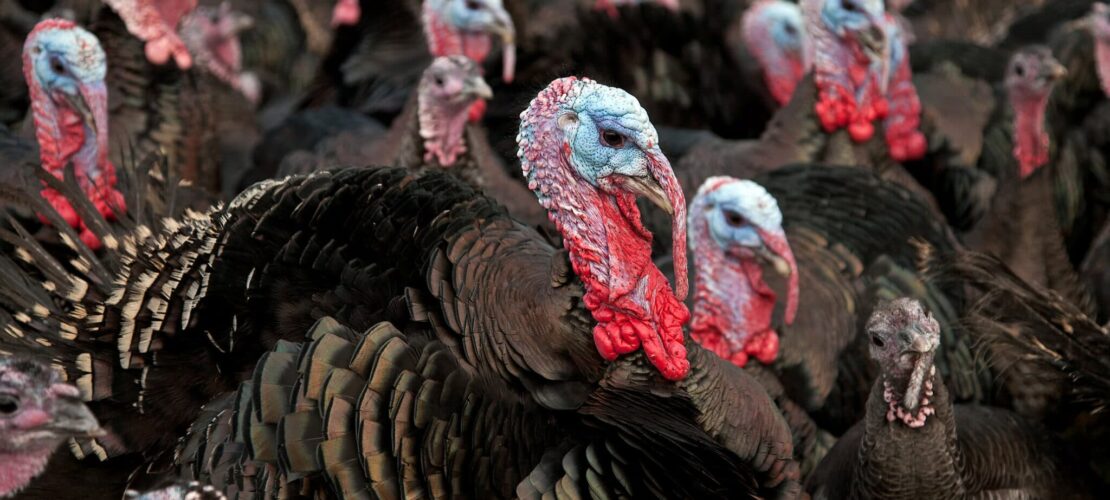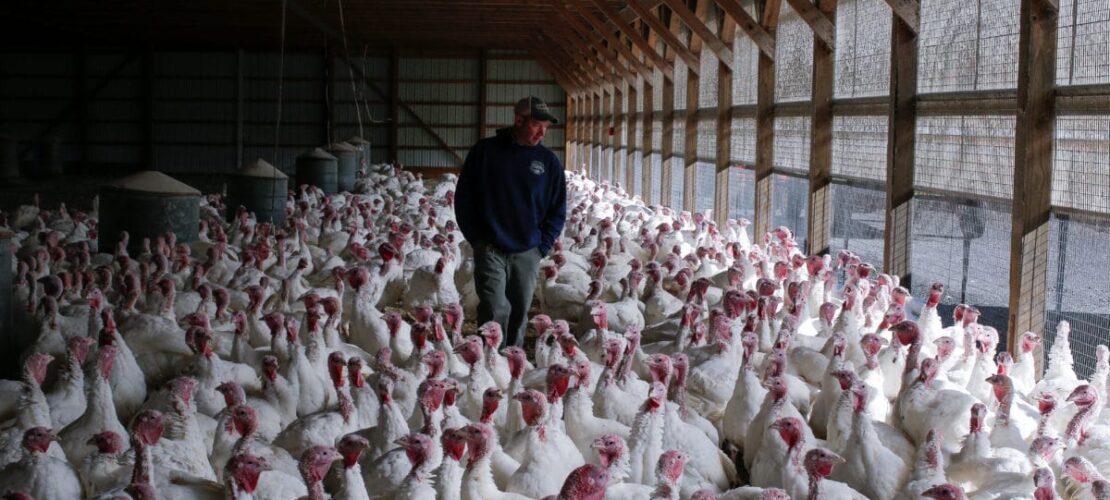
If your usual Thanksgiving plans are shifting this year due to COVID-19, you’re not alone. The pandemic has re-shaped all areas of life, including major holidays.
From college students to grocery retailers to small Turkey farmers, everyone is scrambling to preserve the warm spirit of Thanksgiving in the era of social distancing. But what does this mean for your Turkey Day shopping experience? And what does it mean for the holiday food industry?
In the early days of the pandemic, supply chains around the world faced unprecedented pressure as grocery store shelves were stripped of basic goods like toilet paper, rice, and bread. But even in the days of panic-buying and grocery store food-fights, most of us did not anticipate the pandemic would affect the holiday season.
With Thanksgiving around the corner and COVID-19 cases at record-highs, the food industry is making big adjustments to their usual holiday season operations.
From smaller portion sizes to longer holiday shopping seasons, the pandemic has drastically changed the way individuals and industries prepare for Thanksgiving.
SMALLER GATHERINGS AND SMALLER BIRDS

Consumer research is pointing to smaller dinner gatherings this Thanksgiving. In response, retailers and producers plan to deliver larger quantities of smaller birds.
For instance, a study conducted by poultry giant Butterball found that the number of people planning to host friends and extended family for Thanksgiving is down to 26%. This is a 4% reduction from the pre-pandemic rate of 30%.
Butterball’s survey also found that the number of people planning to gather only with immediate family members has shot up from the usual 21% to 31%.
Grocery retailers–both traditional and digital–have produced similar findings. For instance, FreshMarket found that, with fewer people going to restaurants or traveling to extended family’s homes for Thanksgiving, most consumers plan to do more cooking than usual this year.
Online food service FreshDirect also found that its respondents are planning to host 55% fewer people this year.
Consumer surveys point to significantly smaller holiday gatherings this season. As a result, producers plan to provide smaller turkeys and more diverse protein options that will fit this new demand.
Walmart, for example, is planning to increase its ham inventory this year to provide smaller, budget-friendly protein options. Walmart will also offer smaller turkey sizes to accommodate customers’ smaller dinner plans.
Retailers across the board also expect sales of turkey cuts–such as boneless breasts–to be much higher than previous years.
Even big-box store Sam’s Club plans to downsize its holiday food options this year. Despite being known for its supersized selections, the warehouse will feature significantly smaller holiday staples.
Brownie mix, mac and cheese, hams, and other foods are all going to be offered at a fraction of their usual size in order to fit this year’s smaller dinner tables.
LONGER SHOPPING SEASONS TO AVOID LONG LINES
In addition to cutting down portion sizes, the food industry has also extended its holiday shopping season in an effort to avoid last-minute crowding.
We’ve all been there: you check your calendar and realize Thanksgiving is in two days, and all you have in your pantry is a can of Campbell’s soup from 2003. So you rush to the store with a hefty shopping list, only to be met with long lines, frantic shoppers, and empty shelves.
With most stores enforcing occupation limits and other social-distance regulations, the prospect of last-minute shopping crowds is problematic for retailers.
In order to prevent long queues and chaotic crowds, grocery chains like Walmart and Sam’s Club made it a point to extend their holiday shopping seasons.
As a result, you may have noticed stores geared up for Thanksgiving and Christmas much earlier this year. Sam’s Club even mailed out their holiday catalogs all the way back in October in order to encourage early shopping.
TURKEY FARMERS FACE TROUBLE

With demand for whole turkeys slated to plummet this year, turkey farmers across America face a challenging and uncertain time.
The meat industry has already faced its fair share of trials since the pandemic started.
You might recall the massive COVID-19 outbreaks that overwhelmed meat and poultry processing plants earlier this year. You might also be one of many Americans who opted for tofu over animal proteins as a result of those outbreaks.
Now, poultry farmers are bracing for more hardship during the time of year in which they usually rake in big bucks. On Thanksgiving Day alone, Americans usually consume over 40 million turkeys.
But with smaller Thanksgiving gatherings and more first-time cooks, this number is expected to drop significantly this year. Turkey farmers have struggled to adjust to the low demand for a number of reasons.
First, investments and preparations for Thanksgiving turkeys often start a year in advance. This gives farmers time to raise the turkeys to the right size and maturity just in time for Thanksgiving shopping. So the option to produce fewer turkeys was out of the question for most turkey farms long before COVID-19 threatened the holiday season.
But can’t they just make smaller turkeys? In theory, yes. However, it’s not as simple as one might think. Over the years, the turkey industry–dominated by intense Thanksgiving and Christmas demand–has evolved to operate on a very precise, cyclical schedule.
Everything from turkey feed formulas to turkey genetics is meticulously pre-selected, such that turkeys mature at a predetermined rate. In other words, the industry has created a perfect turkey life cycle that produces an army of 40 million enormous turkeys every Thanksgiving.
Therefore, feeding the turkeys less or slaughtering them earlier (in an attempt to produce smaller birds) might yield lower-quality turkeys with a smaller meat-to-bone ratio.
Despite the rigid production schedule, turkey farmers are doing what they can to adjust their supply. Some farmers have slaughtered their turkeys earlier than usual to bring smaller birds to the market. Others plan to sell more individual parts, such as boneless breasts, wings, and turkey legs.
Farmers are also hopeful that the increase in home-cooks this year may balance out the demand for smaller turkey portions.
CONCLUSION
Nearly every aspect of life has been deeply affected by the COVID-19 pandemic. The food industry and holiday season are no exception.
Longer shopping seasons, smaller turkeys, more intimate gatherings–these are just some ways in which Turkey Day will be different for Americans this year.
At RTG Solutions Group, we believe the economic challenges that have come out of the pandemic can provide business leaders with meaningful opportunities to reassess the status quo.
Despite the hardships many organizations have faced this year, the pandemic has also inspired positive change across the private sector.
Business leaders are more motivated than ever to adopt sustainable and flexible business practices–such as work-from-home and online training–that are better suited for our rapidly changing world.
Need better risk management within your supply chain? Contact us today to speak with one of our boutique supply chain consultants!
